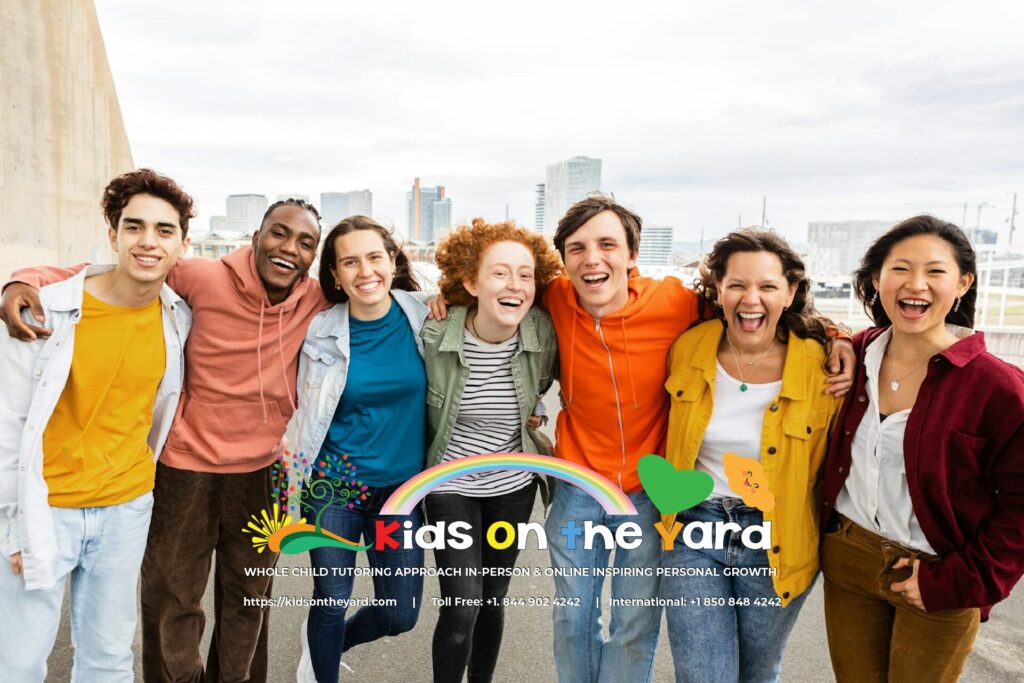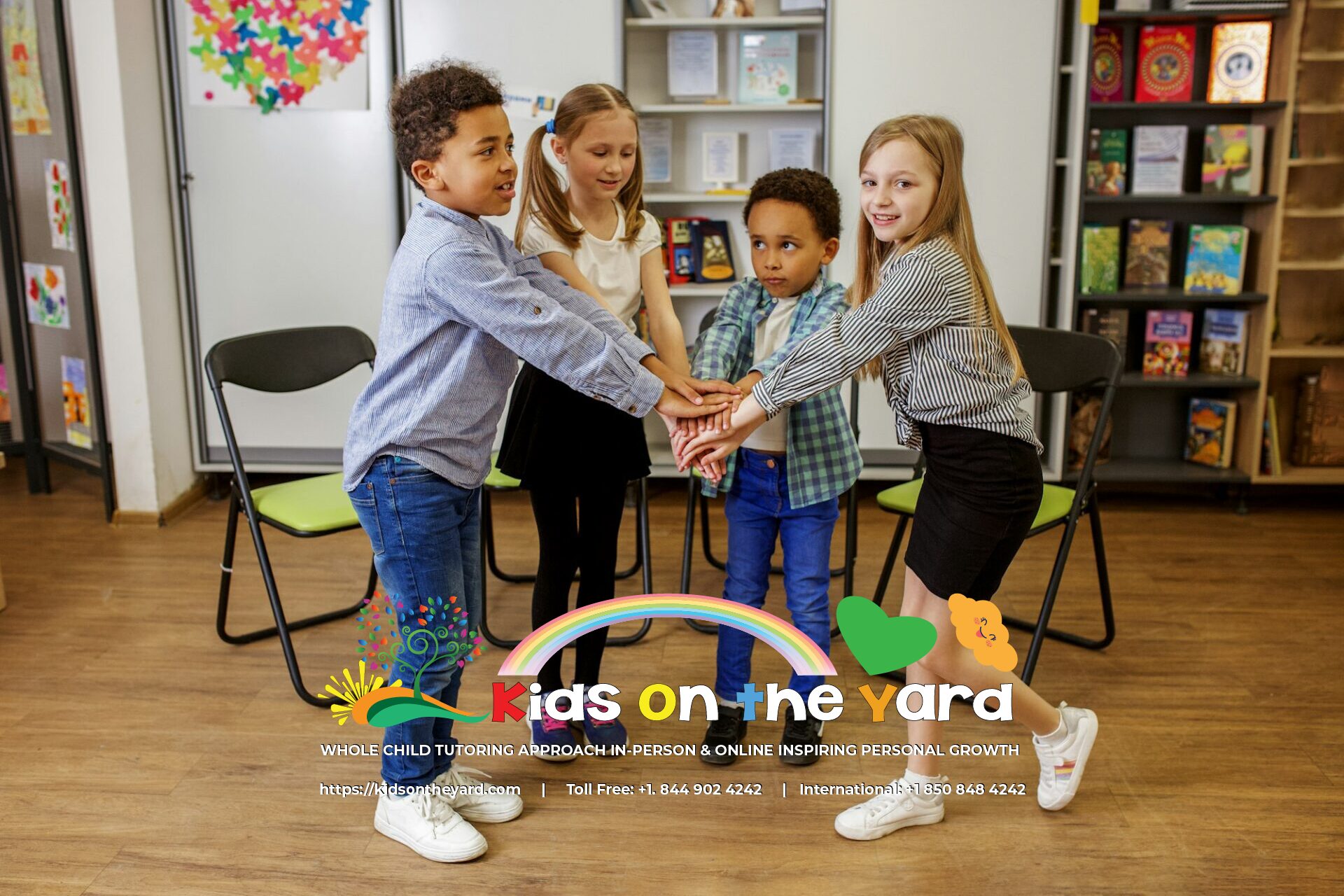|
Audio Article
|
Developing strong social skills is crucial for children as they mature, influencing their interactions throughout life. This guide presents effective strategies for parents to aid their children at each stage, from early childhood through adolescence. By emphasizing empathy, communication, and critical thinking, we aim to facilitate the formation of resilient peer relationships that enrich your child’s social experiences.
Nurturing Early Social Skills
Foster Turn-Taking Through Play
Introduce the concept of turn-taking in simple everyday activities. Engage in play where you and your toddler share roles or toys, like building a block tower or coloring a picture together. Demonstrate the exchange of turns by saying, “Now it’s Mommy’s turn to add a block,” and then, “Now it’s your turn.” Celebrate the act of sharing to instill the values of reciprocity and patience.
Facilitate Structured Play Dates
Arrange small, structured playdates for your toddler with one or two friends in familiar environments. Guide interactions, demonstrating how to invite others to join play activities. Use encouraging language and phrases like, “Would you like to play with the ball too?” that emphasize sharing and kindness to reinforce positive social behaviors.
Model Empathy and Communication
Children learn through observation and direct interaction: model kindness, active listening, and empathy in your interactions with others. Narrate your thought processes out loud in situations requiring understanding or decision-making. “I see that my friend is feeling sad. I will ask what’s wrong and if I can help.” Verbalizing your thought process in situations requiring understanding or decision-making, illustrating how to respond compassionately to others’ emotions.
Encourage and Reinforce Positive Interactions
Acknowledge and praise your child’s positive social actions, no matter how small. Reinforce desirable behaviors such as sharing with expressions of delight and encouragement. Recognizing their achievements in navigating social situations boosts confidence and encourages continued positive engagement with peers.
Introduce Perspective-Taking
Start simple conversations around feelings and perspectives, planting the seeds for empathy. “How do you think it made Sammy feel when you shared your cookies?” Such questions prompt internal reflection, guiding toddlers toward understanding the impact of their actions on others’ emotions. It checks impulsive behavior by inviting them to consider consequences from another’s point of view.
Engaging in these activities opens a channel for developing social skills in your toddler. Remember, every child’s journey is unique; progress may be gradual. Cultivating positive peer interactions now leads to resilient, kind, and socially capable individuals developed under your guidance and observation.
Initiate conversations about feelings and perspectives, fostering empathy in your child. Pose questions that encourage reflection on the impact of their actions on others’ emotions. This promotes consideration of consequences from different viewpoints, tempering impulsive behavior.
Navigating Friendship Dynamics in Elementary School
Cultivate Group Engagement Opportunities
Enroll your child in activities requiring teamwork, such as sports or clubs. These settings promote collaboration and mutual support, which are essential for achieving common goals and developing social skills. Be it sports, music ensembles, or a science club, such settings cultivate the essence of collaboration and mutual support. Studies show that children involved in team activities display better social skills and higher self-esteem.1
Discuss Friendship Dynamics
Initiate regular conversations about the complexities of friendships. Share personal anecdotes to provide insights into making, maintaining, and sometimes letting go of friendships. Offer guidance on reading social cues and practicing empathy in various social scenarios.
Emphasize Respect
Instill the importance of respecting others’ feelings, thoughts, and belongings in friendships. Encourage your child to demonstrate respect in all interactions, emphasizing its role in fostering meaningful connections.
Handle Conflicts Constructively
Guide your child in resolving conflicts calmly and respectfully because conflicts are inevitable in friendships, but they’re also teachable moments. Teach active listening, expressing feelings without aggression, and finding mutually acceptable resolutions. Conflict resolution skills are essential for maintaining healthy friendships.
Promote Kindness
Kindness wins hearts and builds bridges. Suggest simple acts of kindness your child can undertake:
- Sharing a snack
- Complimenting a peer
- Supporting a friend going through a tough time
Highlight how these gestures can strengthen friendships and foster a positive social atmosphere, such as sharing, complimenting peers, or supporting friends in need. Highlight how these gestures strengthen bonds and contribute to a positive social environment.
Teach the Value of Apology
Empower your child to apologize when necessary, demonstrating humility and accountability. Role-play scenarios illustrate sincere apology techniques, emphasizing the importance of acknowledging mistakes and seeking forgiveness.
Limit Screen Time
While technology can keep kids connected, face-to-face interactions are irreplaceable for understanding non-verbal cues and emotions. Research indicates that children who spend more time in front of screens are more likely to have difficulty reading social cues and expressing empathy.2 Encourage physical playdates and outdoor activities that pull them away from screens and into real-world social dynamics.
Implementing these strategies will help polish your child’s social skills and equip them to choose friends wisely and be a good friend in return. Remember, nurturing social skills in children takes time, but the effort is worthwhile.
Encourage real-world social interactions by limiting screen time and promoting outdoor activities. Face-to-face interactions enhance social skills and empathy, which are essential for navigating friendships effectively.
Supporting Adolescents’ Peer Relations and Identity Formation
Foster Open Discussions About Peer Influence
Initiate open discussions about peer pressure with your teenager. Create a safe, judgment-free zone where they can express their feelings and experiences. Talk about different scenarios they might face and brainstorm possible responses. This proactive approach can empower your teen to make thoughtful decisions.
Create a supportive environment for your teenager to openly discuss peer pressure and experiences. Offer guidance on navigating peer influence and brainstorming appropriate responses, empowering them to make informed decisions.
Encourage Diverse Interests
Explore activities and hobbies that align with your teen’s interests. Whether it’s sports, arts, technology, or volunteer work, pursuing individual interests can lead to friendships with peers who share similar passions, helping mitigate negative peer pressure’s impact.
Build Self-Esteem
Work on building your teen’s self-confidence. Compliment their efforts, talents, and unique qualities regularly. Teens with a strong sense of self are less likely to succumb to peer pressure as they value their opinions over fitting in with the crowd.3
Promote Critical Thinking
Encourage your teen to think critically about their choices and the consequences of giving in to peer pressure. Ask open-ended questions that prompt them to consider the long-term effects of their actions. Developing this mindset helps teens to pause and think before making decisions.
Lead By Example
Demonstrate positive social interactions in your own life. Show how you handle disagreements, maintain boundaries, and choose friends who respect and support you. Watching adult behavior teaches teens much, so modeling healthy social practices is vital.
Encourage Empathy
Discuss the importance of understanding and respecting different perspectives. Highlight the value of empathy in maintaining friendships and ask your teen how they would feel in their friends’ shoes during difficult times. Empathy fosters deeper connections and can deter judgmental behaviors.
Teach Assertive Communication
Equip your teen with assertive communication skills. Practicing how to say “no” respectfully but firmly and express their needs and feelings can help them navigate peer pressure while maintaining their integrity and friendships.
By implementing these strategies with patience and understanding, you can help your teenager build a solid foundation for genuine friendships that withstand peer pressure. Nurturing these skills takes time, but the payoff is well worth it, setting the stage for healthier relationships in the future.
Parents play a crucial role in shaping their children’s ability to form lasting friendships through engagement and support in developing social skills across different stages of childhood and adolescence. By applying the strategies outlined in this article, you can help lay a foundation for your child that enhances their current interactions and prepares them for healthy relationships in the future.

F.A.Q
Why are social skills important for children’s development?
Strong social skills are crucial as they influence interactions throughout life, shaping resilient peer relationships and enriching social experiences.
How can I nurture early social skills in my toddler?
Start with activities like turn-taking through play, structured playdates, modeling empathy and communication, reinforcing positive interactions, and introducing perspective-taking.
What strategies can help my elementary school child navigate friendship dynamics?
Encourage group engagement opportunities, discuss friendship complexities, emphasize respect, teach conflict resolution, promote kindness, highlight the value of apology, and limit screen time.
How can I support my teenager’s peer relations and identity formation?
Foster open discussions about peer influence, encourage diverse interests, build self-esteem, promote critical thinking, lead by example, encourage empathy, and teach assertive communication.
What’s the role of parents in shaping children’s social skills?
Parents play a crucial role by engaging and supporting children across different developmental stages, facilitating the formation of lasting friendships, and preparing them for healthy relationships in the future.
How can social-emotional coaching benefit parents in supporting their children’s development?
Social-emotional coaching provides parents with valuable strategies, resources, and support tailored to their child’s needs. It offers guidance on understanding and addressing social and emotional challenges, fostering empathy, communication, and resilience in both parents and children.
What role does social-emotional coaching play in strengthening the parent-child relationship?
Social-emotional coaching fosters a deeper understanding between parents and children by promoting open communication, empathy, and mutual respect. It provides parents with tools to effectively navigate difficult conversations, understand their child’s perspective, and build a strong foundation of trust and support.
How does social-emotional coaching help children develop self-awareness and self-regulation skills?
Social-emotional coaching teaches children to recognize and manage their emotions, thoughts, and behaviors in various social situations. Through guided exercises and feedback, children learn to identify their feelings, cope with stress, regulate their emotions, and make responsible decisions, leading to improved self-esteem and confidence.
Can social-emotional coaching address specific challenges, such as bullying or social anxiety?
Yes, social-emotional coaching can provide tailored strategies and support to help children navigate specific challenges like bullying, social anxiety, or peer conflicts. By teaching assertiveness, coping mechanisms, and problem-solving skills, children learn to advocate for themselves, build resilience, and develop healthy coping strategies in challenging social situations.
How does social-emotional coaching empower children to build and maintain positive relationships with peers and adults?
Social-emotional coaching equips children with essential social skills such as empathy, active listening, conflict resolution, and cooperation. By practicing these skills in a supportive environment, children gain the confidence and tools needed to initiate and sustain positive relationships with peers and adults, fostering a sense of belonging and connection.
Key Insights for Parents: Nurturing Social Skills in Children
Parents can rely on the Kids on the Yard educational team and coaching program to aid their children’s social skill development:
- Early Years: To lay a strong foundation, focus on turn-taking, structured playdates, empathy modeling, positive reinforcement, and perspective-taking.
- Elementary School: Encourage group activities, discuss friendship dynamics, teach respect and conflict resolution, promote kindness, emphasize apology, and limit screen time to navigate friendship complexities effectively.
- Adolescence: Facilitate open discussions about peer influence, support diverse interests, build self-esteem, promote critical thinking, lead by example, encourage empathy, and teach assertive communication to empower teens in forming genuine relationships while navigating peer pressure.
By leveraging these strategies, parents can actively shape their children’s social development, fostering healthier relationships and resilience for the future.
- Smith PK, Shu S, Madsen K. Characteristics of victims of school bullying: Developmental changes in coping strategies and skills. In: Juvonen J, Graham S, eds. Peer Harassment in School: The Plight of the Vulnerable and Victimized. New York, NY: Guilford Press; 2001:332-352.
- Rideout VJ, Foehr UG, Roberts DF. Generation M2: Media in the Lives of 8- to 18-Year-Olds. Menlo Park, CA: Henry J. Kaiser Family Foundation; 2010.
- Steinberg L, Monahan KC. Age differences in resistance to peer influence. Dev Psychol. 2007;43(6):1531-1543. doi:10.1037/0012-1649.43.6.1531


